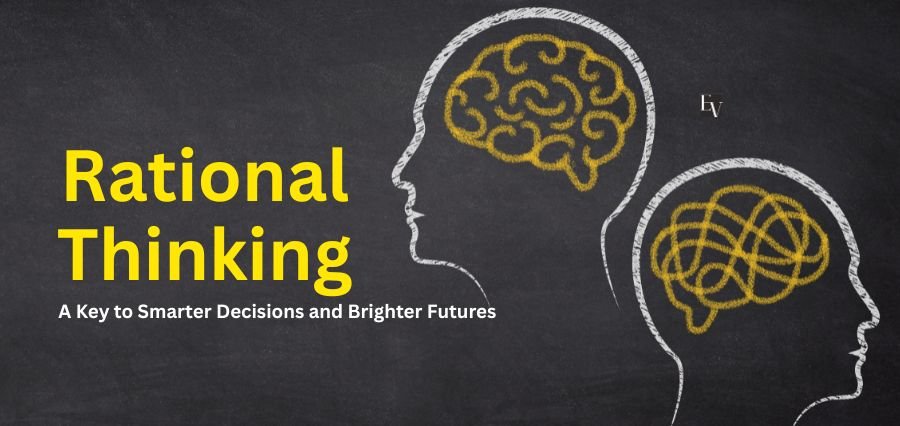Rational Thinking Meaning – The Foundation of Intelligent Decision-Making
Rational thinking meaning is being able to think rationally, verify facts, and make decisions logically rather than by emotions. It is no longer a requirement for students and professionals alone in today’s age of information saturation and snap decision happy but for anyone willing to enjoy crystal-clear decision-making. It helps one pause, look at things objectively, and respond based on reason rather than act impulsively full of emotion.
Whether it’s solving an equation for math, career change, or navigating relationships, the rational thinking meaning as your guide is most critical in making well-written and well-balanced decisions. Let’s see how this set of thinking tools affects everyday life, learning, and leadership.
What is the Rational Thinking Meaning Now?
Rational thinking meaning in contemporary life isn’t just school debate anymore. It’s the matter of making wise decisions by reading into facts, following consequences, and staying out of mental errors. With a script news production, quick social media, and sensational garrulousness, rational thinking is the inner thinking compass that guides us to fact and justice.
From career selection to money management personally, all such thinking assists you in analyzing pro and cons, anticipating results, and resolving issues in a constructive way. It instills mental toughness by forcing the mind to pause, reflect, and then move ahead further and not otherwise.
Why Students Need to Know the rational Thinking Meaning
At school level, rational thinking meaning would be an assessment of whether a student is able to think rationally or not, reason methodically from problems, and be logical. Such students would generally perform well in such subjects like mathematics, science, and even literature and philosophy, where order of thinking is also extremely critical.
In addition, rational thinkers are less vulnerable to peer pressure, emotional manipulation, or decision fatigue. As more and more education is automated and carried out by AI and technology-based platforms, the emphasis on rational thinking is able to future-proof learning by developing judgment, flexibility, and self-awareness in students.
Emotional Intelligence vs. the Rational Thinking Meaning
Where emotional intelligence is the capacity to understand and live with feelings, the meaning of rational thinking is the acquisition of facts and staying objectively decision-making. They are both important, but they play opposite roles. Rational thinkers do not lack emotion; they just possess an inkling where logic has no choice but to overcome gut instinct.
Combining rational thinking with emotional intelligence produces well-balanced decision-makers who can lead, negotiate, and mediate from head and heart. In business and leadership situations, the two skills tend to produce long-term success.
Traits Embodied in the Rational Thinking Meaning
In order to visualize the rational thinking meaning better, it is helpful to visualize a rational thinker’s attributes:
- Objective Analysis: Fact-based decision making over opinion.
- Problem-Solving Skills: Skills to dissolve complex problems into beneficial components.
- Open-Mindedness: Toleration towards the hearing of other opinions and facts.
- Logical Consistency: Ideas are arranged in a structured manner that justifies conclusions.
- Transparent Decision-Making: Decisions are taken following prudent consideration of all the available choices.
All these are not born but can be developed with the lapse of time through tireless and ascetic efforts and practice.
How to Build the Rational Thinking Meaning in Everyday Life
To put the rational thinking meaning into action in everyday life, utilize the following useful tips:
- Stop Before Acting: Condition your mind to stop and review things prior to acting.
- Test Assumptions: Test your own assumptions regularly in order to prevent confirmation bias.
- Find Evidence: Support your ideas or conclusions using valid sources and facts.
- Participate in Debates: Balanced debates help to put reasons into perspective and identify blind spots.
- Practice Mindfulness: Stay present to see things as they are.
Habit, reflection, and a mind wish to increase encourage rational thinking.
The Rational Thinking Meaning in Leadership and Decision-Making
As leaders, the definition of rational thinking needs to be understood. Leaders take decisions that are of high expense and involve people, profits, and long-term objectives. Rational thinkers use fact-based reasoning, avoid acting on feelings during crisis situations, and build trust within groups.
In addition, rational leadership creates organization cultures based on reasonableness, effectiveness, and innovation. Rational leadership inspires others to be reflectively rational about things and creates work culture that promotes openness and rational thinking.
Obstacles to the Implementation of the Rational Thinking Meaning
There are several obstacles which might hamper rational thinking development:
- Cognitive Biases: Since human beings have cognitive weaknesses, they possess weaknesses such as overgeneralization or anchoring.
- Emotional Overload: Stress and tension in emotions typically veils rational thinking.
- Misinformation: Half-truths in the internet media makes rational thinking even more difficult.
But by becoming aware of one’s self and living mindfully, one is capable of avoiding such traps.
Last Thoughts: Adopting the Rational Thinking Meaning as a Life Capability
It is not a mental exercise to learn the rational thinking meaning—it’s a radical new manner of behaving, learning, and thinking that is absolutely essential in this age when emotion is at a fever pitch and opinions are racing beyond information. Rational thinking is an useful skill which keeps us grounded in fact, sense, and sanity.
No matter what one is–student, entrepreneur, teacher, professional–the practice of rational thinking will lead to better decision-making, more effective relationships, and more intellectual honesty. It leads one not just to make more intelligent decisions, but to appeal to reason and justice to the world in them.





